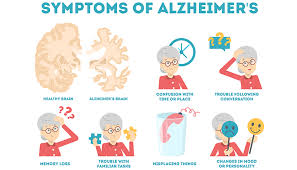Alzheimer’s disease is one of the most challenging health conditions of our time. As the most common cause of dementia, it affects millions of people worldwide, slowly robbing them of memory, independence, and the ability to carry out everyday tasks. Despite the difficulties, ongoing research offers hope for prevention, better treatments, and improved quality of life.
In this article, we’ll explore what Alzheimer’s disease is, its causes, symptoms, diagnosis, treatment options, and how lifestyle changes can play a role in brain health.
What is Alzheimer’s Disease?
Alzheimer’s disease is a progressive brain disorder that leads to memory loss, cognitive decline, and behavioral changes. Unlike normal aging, where occasional forgetfulness is common, Alzheimer’s gradually worsens over time and interferes with daily life.
It is characterized by the build-up of abnormal proteins in the brain—amyloid plaques and tau tangles—that damage and kill nerve cells. This leads to shrinkage of brain tissue and loss of communication between neurons.
Who is at Risk?
While Alzheimer’s disease can affect anyone, certain factors increase the risk:
- Age – Most common after age 65
- Genetics – Family history and genes like APOE-e4 increase susceptibility
- Lifestyle factors – Poor diet, lack of exercise, smoking, and high alcohol use
- Chronic health conditions – Diabetes, hypertension, obesity, and cardiovascular disease
- Head injuries – Traumatic brain injuries raise long-term risk
Early Symptoms of Alzheimer’s Disease

Recognizing the early signs is crucial. Symptoms often begin subtly:
- Memory loss that disrupts daily life
- Difficulty solving problems or planning
- Confusion with time or place
- Trouble following conversations or writing
- Misplacing items frequently
- Changes in mood, behavior, or personality
These signs worsen gradually, leading to advanced dementia, where individuals require full-time care.
Stages of Alzheimer’s Disease
Alzheimer’s typically progresses in stages:
- Mild (Early Stage): Forgetfulness, losing track of time, trouble organizing.
- Moderate (Middle Stage): Increased confusion, difficulty recognizing loved ones, wandering, personality changes.
- Severe (Late Stage): Loss of speech, inability to walk or swallow, full dependence on caregivers.
Diagnosis
There’s no single test for Alzheimer’s, but doctors use:
- Medical history and cognitive tests
- Neurological exams
- Brain imaging (MRI, CT scans, PET scans)
- Blood tests to rule out other conditions
Early diagnosis allows for better care planning and access to available treatments.
Treatment for Alzheimer’s Disease
Currently, there is no cure for Alzheimer’s, but treatments can manage symptoms and slow progression.
- Medications
- Cholinesterase inhibitors (Donepezil, Rivastigmine, Galantamine) improve communication between brain cells.
- Memantine helps regulate glutamate, a chemical messenger involved in learning and memory.
- New drugs like Lecanemab are being studied to target amyloid buildup directly.
- Therapies and Support
- Cognitive stimulation and memory exercises
- Physical activity and occupational therapy
- Support groups for patients and caregivers
- Lifestyle Modifications
- Healthy diet (Mediterranean/DASH diets)
- Regular exercise
- Good sleep hygiene
- Social engagement and mental stimulation
Prevention and Brain Health
While we cannot completely prevent Alzheimer’s, research suggests that adopting a brain-healthy lifestyle lowers risk:
- Stay physically active
- Maintain a balanced diet rich in fruits, vegetables, and omega-3s
- Keep blood sugar and blood pressure under control
- Challenge the brain with learning and problem-solving
- Stay socially active to reduce isolation and depression
Living with Alzheimer’s: Human Side of the Disease
Beyond the science, Alzheimer’s is deeply personal. Families often struggle with the emotional and physical demands of caregiving. Patients may feel frustration, confusion, and fear as independence slips away.
Support systems, caregiver education, and compassion play a crucial role in improving quality of life. Communities and governments are increasingly focusing on dementia-friendly programs to reduce stigma and provide better care.
Hope for the Future
Research into Alzheimer’s disease is advancing rapidly. Scientists are exploring new treatments to target amyloid and tau proteins, improve brain energy metabolism, and even use lifestyle interventions like Red Light Therapy or supplements such as Methylene Blue for potential neuroprotective effects.
While a cure remains elusive, progress in early detection and therapy offers hope. The fight against Alzheimer’s is global, and every new discovery brings us closer to better outcomes.
Also Read: Dental Insurance
Conclusion
Alzheimer’s disease is more than memory loss—it’s a condition that reshapes lives, families, and communities. Understanding its causes, symptoms, and treatments is the first step in managing it effectively. With advances in medicine and lifestyle awareness, there is hope for slowing its progression and improving quality of life.
By raising awareness, supporting research, and embracing healthier habits, we can all play a role in reducing the impact of Alzheimer’s and paving the way for a future where brain health is better protected.

Leave a Reply